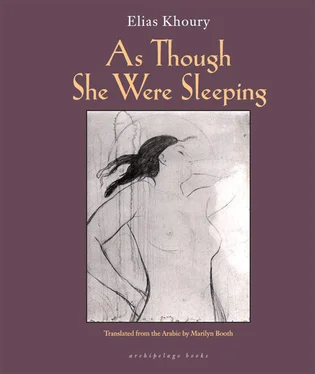What does this stranger want? her mother asked her.
Milia knew nothing about the man and she was not disposed to fall in love with him. His hair always glistened as if bathed in oil, and his whitened temples suggested he was already some distance down life’s road. She did not see in him the portrait of a long-awaited and much-anticipated lover but rather the image of a father searching for his lost daughter. And when she said yes, she did not tell anyone the true reasons why she was accepting him as her husband.
She told her brother Musa that she had assented because the prospective groom resembled him. She told her mother that she had grown tired of waiting and wanted to get married. She told Sister Milana that she was leaving home to escape the stifling atmosphere that had enveloped the house after her brother Salim had moved to Aleppo and her mother’s illnesses had proliferated.
When she spoke to him for the first time she told him he was an old man.
Me?
She pointed a finger at the graying on his temples.
I started going gray when I was twenty! he responded. Do you know what gray hair means? It means we are lions. Among the animals, the only one who goes gray is the lion.
He told her he was thirty-seven. And that he would get married before the age of forty. The first age of prophecy has passed me by, he said. I was not married in time. I’m not going to let the second one slip by. If I do, it’s all over for me.
Milia didn’t understand what he meant but she smiled. Emboldened, the man said he loved her and wanted her, and then he asked her if she loved him.
How can I love you when I don’t even know you?
But look at me — I love you without knowing you. I feel you, who you are, from inside, and that’s enough. Do you have a feeling about me?
She nodded, not to say yes but because she didn’t know; but Mansour took her nod as a quiet yes .
So, it’s a possibility? he asked.
She looked into the distance and closed her eyes.
Milia did not understand what Mansour meant by the two ages of prophecy until they were in the Hotel Massabki in Shtoura. On the second night after their wedding, he moved closer to her. He wanted her.
No, she said. I’m tired. She rolled onto her side, turning her back, and slept. He left her to float downward, submerged in her deep breathing. Then he snuck toward her from behind and began to fondle her. He turned her over and then he was on top of her and had her. In the night Milia felt drenched and sensed the wetness of the sheet beneath her and she began to shake with cold. She wanted to get up and go into the bathroom but she felt her knees turn to jelly. She closed her eyes and tried to go back to sleep.
Wake up, wake up! This is no moment for sleeping.
She opened her eyes. She rested her head against the back of the bed. His torso was bare, a cigarette was between his lips and his eyes shone.
Look — how pretty you are! Look at yourself in the mirror. Love makes a woman beautiful.
She shut her eyes and heard him talking about the prophetic ages that so concerned him. The Messiah’s age had missed him, he said. But he would not let the same thing happen with Muhammad’s age.
Though Milia still had no idea of what he meant, she did not ask. She felt a burning sensation low in her body and she wanted something to drink. But with her nightgown so damp she was too embarrassed to get out of bed.
The Messiah was crucified when he was thirty-three years old. Muhammad’s prophethood appeared when he turned forty. Men have to become men at one of those two ages, Mansour said. If a man misses both, then everything will pass him by. I’ve passed the first age already. But I haven’t reached the second age yet, and now I’ve found you.
The driver was right, Milia whispered. You are mad.
In the car had come love. Milia closed her eyes and searched for the tarbush that her uncle Mitri had worn so that she could put it on Mansour’s head. She found it in the hollow that held her dreams. She saw Mansour draping her uncle’s white silk qumbaz across his shoulders, tipping a red tarbush forward on his head, and chasing after her with a slender reed cane. The cane brushed Milia’s brown feet and the man wearing the qumbaz shouted at her to eat her arus el-labneh . Milia in her short pants leapt and danced under the blows of the cane, fire inflaming her feet. The cane receded and the girl sat on the ground, swallowing her sandwich of labneh and olive oil, tasting the white onion and green mint.
Milia eats but the sandwich lasts and lasts. She turns to her uncle Mitri and invites him to share her food. The man comes nearer and devours the sandwich in one bite. Milia snatches the cane from the man’s grasp and runs, and he hurries after her. Milia is in a garden of lush greenery, springing over hollows filled with water. The man’s voice pleads with her to stop and give him back the cane. She falls to the ground. Above her, the uncle breathes heavily. She opens her eyes. The uncle fades from view, the tarbush vanishes, and she finds herself in the car encased in the white shroud of fog.
The uncle has disappeared but he has left behind him the play of a smile on the woman’s lips and a red tarbush tilting forward on the head of a man she has decided to love. He has left a woman lying on the backseat of an American-make taxi. Milia gives herself up to this woman as she allows herself to sink into a shadowy dream from which she does not awaken until they reach the Hotel Massabki. Nor does she see Mansour’s darkly blue face — the blueness brought on by the cold blending into his dark skin color — until they are at the hotel, just before midnight. Mansour shakes her by her upper arm and she hears a voice. Yallah , we’re here!
Milia comes to as if emerging from a coma. Shu. . wayn? What’s. . where are we? It takes her a moment to remember that she is a bride arriving for her honeymoon. The car door opens and Mansour stands there waiting for her, hoisting the suitcase. He points to the hotel entrance and she walks beside him, then turns back and sees the bald head of the driver, who droops over the steering wheel, his hands slack, as though he is sleeping.
And the chauffeur? she asks.
We’ll see about him later, said Mansour, and led her to a high wooden door. He knocked for some time before someone appearing to be the hotel owner opened the door. George Massabki was in white pajamas covered partially by a brown abaya. Khawaja George’s small eyes peered at them, marks of astonishment reshaping his face as if it was completely beyond him to believe that this strange pair had landed here at his door, and at this hour of the night, for the purpose of savoring the honey of marriage.
Ahh, you’re the newlyweds, said the hotel owner then, trying with the sleeve of his abaya to mute a cough that swallowed half his words.
Mansour nodded before swiveling to indicate the car parked in front of the building.
Welcome, welcome! Hamdillah a’s-salameh , praise God you’re safe and sound after your journey. I told myself you wouldn’t be coming in this cold and snow. Please come in, welcome! The room will be ready in a few minutes.
He left them at the door, disappearing inside where they heard him shouting. Wadiia! Wadiia! The bride and groom are here. He rubbed his hands together in front of the glowing stove and said, as though he were speaking to himself, What a night! Then, louder, he called, Where are you, Wadiia, light up the stove in the newlyweds’ room and come here. You know, monsieur. . He turned to Mansour but did not find him there. He saw Milia standing before him, still in her brown overcoat, which disguised the white wedding gown almost completely, her big eyes sleepy and color beginning to suffuse her cheeks.
Читать дальше












